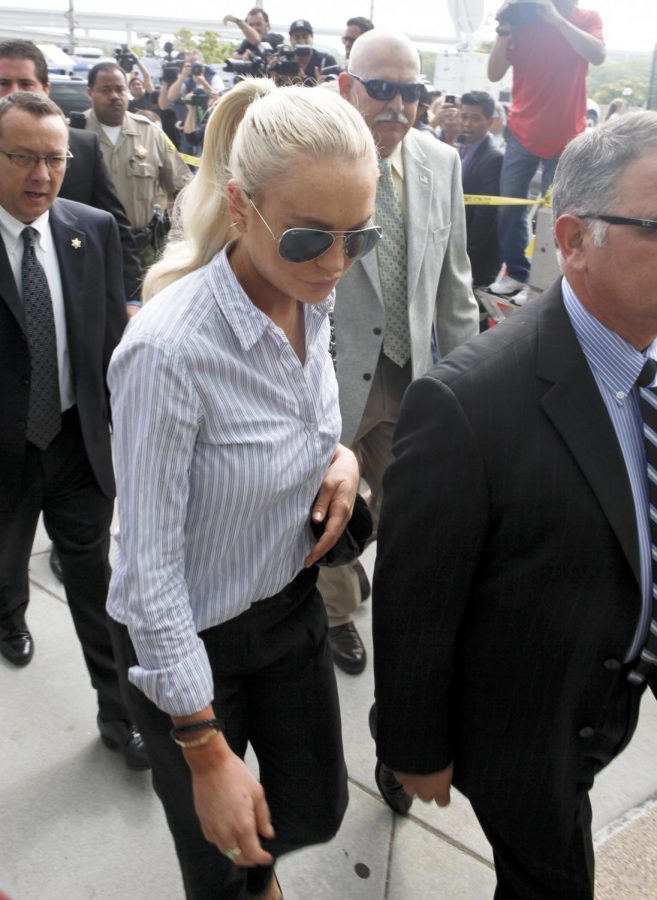It’s no secret that women are objectified at every corner in our society and culture, the media is no exception. The media likes to treat stories of women as dramas. They report on women and their most vulnerable states in a way that heightens their issues and treats them as the antagonizer at every opportunity, even if they are not.
When it comes to the topic of the exploitation of women in the media, I refer to Hollywood stars: Lindsay Lohan, Britney Spears, and Amanda Bynes. These women come to mind mainly because their names are often associated together as public figures who have had their dirty laundry publicly aired, while also experiencing traumas of their own. These select few Hollywood stars peaked in their careers but have yet to attain such successes again.
With these highly publicized celebrities, it’s apparent that instead of the media treating them as human beings in their coverage, they have metaphorically been torn apart. This practice is often attributed to their public figure status which, in my opinion, the justification is abused and taken advantage of.
The stars’ pasts are still attached to their names and an open comeback has been difficult for each of them. Scaachi Kowl of Buzzfeed News reports that Lindsay Lohan is still reinventing herself after being blacklisted by Hollywood, Britney Spears is still regarded as mentally unstable and is still under her father’s conservatorship igniting the movement #FreeBritney, and Amanda Bynes attempted a comeback with a Paper Magazine spread in November 2018 but continued to be treated like a has-been.
These women have had highly successful careers but have not managed to get back on their career trajectories mainly due to how the media has changed Hollywood and the public’s perception of their persons.
Having issues of a sensitive nature can be difficult to manage, but on top of that, to have them be so widely discussed and known only elevates a situation tenfold.
On the other hand, even though this concept might seem obvious, its occurrence does not exist for men in the public eye. There is a clear dichotomy in the treatment of men vs women in the media. An example to highlight this point: the male adjacent to Lindsay Lohan, in my opinion, Robert Downey Jr.
Hollywood star Robert Downey Jr. in the 90s had his fair share of confrontations with nightlife and drug abuse as a young, up and coming actor. The same can be said of Lohan during the mid to late 2000s as she grew into her adult self.
One managed to get their career back almost instantaneously and the other has not. Nobody reminds us of Downey Jr’s hardships and if they do, they are not quick to blame him for his own actions. When it comes to Lohan, however, everybody seems to remember and these same individuals are quick to remind us of how and why she is at fault for her hiccups.
The clear double standard of these two public figures is evident enough of the misogyny and sexism that still exists not only in Hollywood but in our media, society, culture, and world altogether.
Conventionally attractive women are favorites for the media to cover. It is a media favorite to portray these women as weak and unhinged.
This conversation about the exploitation of women goes beyond what the term suggests on a surface level. It is also important to note that women of color are victims in the conversation of being objectified and vilified by the media.
The successful tennis professional, Serena Williams, has long been a victim of the media as a strong, successful, and black female. Following her controversial US Open loss, the “angry black women” trope re-emerged, stated Ritu Prasad from the BBC.
The film “Killing Us Softly” by Jean Kilbourne, explores the media’s exploitation of women. “Killing Us Softly” discloses that advertising is the foundation of the mass media to not only push and sell products but ideas and concepts; one of these being the objectification of women.
There are stereotypes about how women should act and as a result, women are placed into boxes because our culture often prefers them to be confined. Advertising campaigns targeted at women are done in a way that is intended to convince women that x will solve a problem of theirs. This is because American culture convinces us that transformations to fix ourselves are possible by trying hard enough. If you do not attain these expectations from society, you become convinced that somehow you are abnormal. But these very companies marketing themselves as solutions know very well that what they are trying to sell truly solves nothing.
The existence of these concepts creates a cyclical routine that affects the self-esteem of women everywhere which also alters what men view women as and what they expect them to look, act, and be like. Advertisements are partly guilty of making us carry these subliminal messages with our persons to take into society. The objectification of women also has implications beyond the perceptions of their beings, however. This conversation though extends further than the exploitative portrayal of women by the media and reaches how the influence of the media has effects on all factors of our lives.


